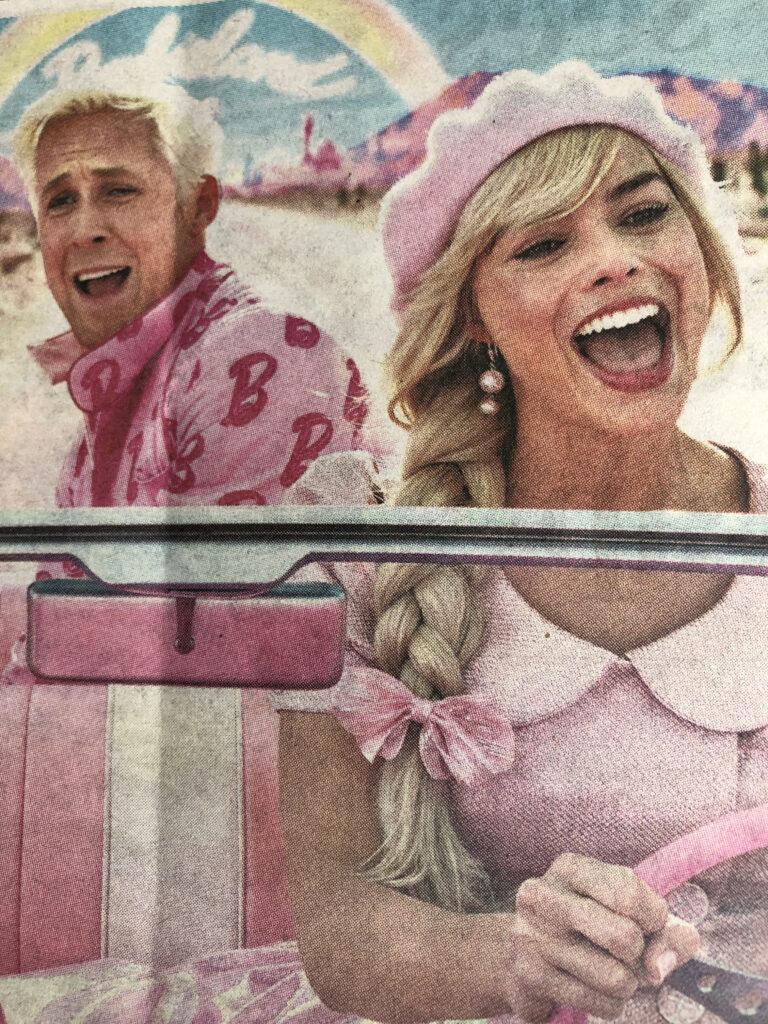A film about a doll leaving a make-believe ‘paradise’ to visit ‘real world’ is bound to demand a large suspension of disbelief and this film by Greta Gerwig certainly requires that. But amid the glorious insanity and inanity there is a story about feminism trying to get out, which it often does.
Margot Robbie is Barbie (mind you, all the women in Barbieland are called that) and Ryan Gosling is Ken (as are all the other men except one called Alan). In Barbieland, nothing ever changes, every day is the same, which is exactly how Barbie and her friends like it. But during a party Barbie utters the word ‘death’, and the partying grinds to a halt. Everyone looks shocked. Trying to rescue the situation, she explains she meant to say “I am dying to dance”, but a spell has been broken. Soon she can no longer walk on the tips of her toes and she has cellulite. Weird Barbie (Kate McKinnon), something of an outcast elder sister around the place, tells her she must to go the real world – Los Angeles, of course – to find the cure for what has happened. Uninvited, Ken goes along with her for the ride and the adventure.

In the real world, Barbie is in for a shock. She realises that men are in charge – “everything is reversed”; something which Ken, in contrast, very much enjoys. She anticipates that young women would greet her as a role model; an icon. Instead she is accused of representing all their ills and being a “fascist”. She winds up being kidnapped by executives of Mattel, the company behind the Barbie doll and this movie. (She is shocked, again, to realise the company is entirely run by men.) It is resolved that in order to return her home they will repackage her in the showcase box in which she first came into being. She is not keen. “Get in that box, you Jezebel,” shouts Will Ferrell, who plays the CEO of Mattel. Instead she runs away.
Eventually she arrives back in Barbieland only to find that Ken has got back before her and men have taken over everything. She is distraught. Also, she declares she doesn’t want to be “the stereotypical Barbie any more”. As Helen Mirren drily comments in her part as the narrator: “Note to producers: Margot Robbie is the wrong person to cast if you want to make this point.” Robbie does indeed look beyond beautiful.
While I obviously don’t wasn’t to spoil the plot (if that is what it is) for you, things reach a generally happy conclusion. Ken admits he found it hard work trying to do stuff and in any case he was not so interested in the patriarchy once he realised it didn’t necessarily involve horses.
In her opening monologue, Mirren says: “Thanks to Barbie, all the problems of feminism and equal rights have been solved.” Gerwig and her real-life partner, Noah Baumbach, who co-wrote the script, obviously know that’s nonsense, and towards the end a flamboyant speech by real-world Gloria (America Ferrera) on the impossible balances of being a women – “be pretty but not too pretty so as to be a threat to other women” – vehemently makes the point that there is a long way to go. Like Barbie with her toing and froing between her home and LA, we’re on a journey.
